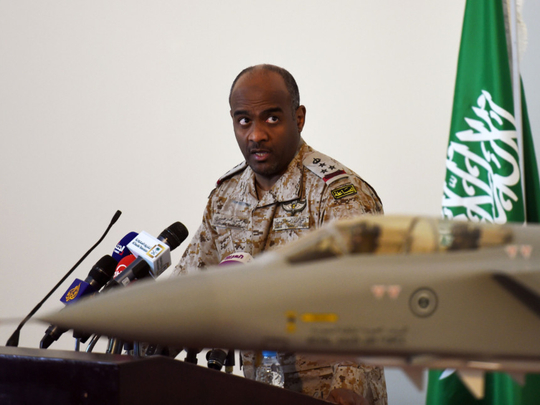
Manama: When Brigadier General Ahmad Asiri, the spokesman for the Saudi-led coalition conducting military and humanitarian operation in Yemen, gave his first media conference, few people had anticipated to witness a new media crisis management.
Accustomed to rhetoric of vague, ambiguous and pompous words in live Arab media interactions, Arab viewers were certain that Asiri, a military man, would fit the stereotype and would resort to wooden language to dodge salient issues.
However, Asiri reportedly surprised everyone, showing an unsuspected ability to respond in fluent Arabic, English and French to all questions fired by journalists.
The Saudi brigadier general became an instant hero and Saudi journalists, both in the public and private sector, seized the occasion to adopt new standards in media crisis management.
“The Saudi media truly rose to the occasion and was able to handle the situation capably,” Saud Kateb, the assistant undersecretary for foreign media and spokesperson for the Saudi information ministry, said. “The media showed new aptitude, be it at the level of the Coalition spokesperson who emerged every day to highlight facts and answer question by local, Arab and international media, or at the level of the journalists who were at the borders,” he said, quoted by local news site Sabq.
Journalists and analysts also contributed to the enrichment of the media landscape through their views and political analyses, he added.
“The significance of the media, especially in times of crisis, should never be underestimated. It is the fourth front, alongside the terrestrial, maritime and aerial fronts,” he said. “We are pleased that the media management of the situation has been positive. Since the first day of the operations, the media approach has been to highlight the views of the coalition and to refute the claims and allegations made by the others,” he said. “The media has been crucial in conveying the reality on the ground to the international community. The social media has also played an important defensive role, explaining facts and exposing lies and rumours. Operation Storm of Resolve was a great occasion for the media to show it has learnt to manage crises in a much better way,” he said.
The increasing prevalence of social media in the Gulf countries in particular and in the Arab world in general has had a great impact on shaping the local and regional media landscape, forcing the traditional media to change its options and approaches.
According to a Bahraini expert in communication, around one-third of Arabs today rely on social media as their principal source of news, a rate that is equal to the number of those who use traditional media.
“When we look at the penetration rate of leading social media and microblogs in the Arab world, we realise how critical they have become,” Maysa Al Dhawadi, the head of the Follow Up Directorate at the Information Affairs Authority (IAA) said.
“Social media are excellent tools for newsgathering and reporting, especially in times of crises or emergencies, but they can also be a source of ominous bias and unethical behaviour.”
Figures from 2014 indicate the penetration rate of Facebook in the UAE was 54 per cent, 47 per cent in Qatar, 43 per cent in Kuwait, 36 per cent in Bahrain, 28 per cent in Oman, and 27 per cent in Saudi Arabia.
“The high penetration rate of social media in the Arab world warrants a series of accords on ethics and agreements for clear legislation to ensure that modern communication tools promote robust dissemination of information and factual accuracy and that they are not misused for negative purposes,” Maysa said.
“The remarkable amount of details and of ‘real-time’ reporting from people at the sites where news events are breaking or unfolding is amazing. People may provide precious insights into what is happening. However, without proper evidence, we need to remain sceptical until the information is tightly verified. Discerning between the truth and the fiction, the fairness and the exaggeration, is a grave challenge and we have to tread very carefully,” she said.
The Gulf Cooperation Council [GCC] states have been paying special interest to the use of media in crisis management through promoting public awareness and deepening a national sense of responsibility and partnership.
Yet, there is a profound need to constantly study the links between social media and emergencies. Studies should focus on how such media can affect the situation on the ground and their effect on local, regional and international perspectives regarding any development or disaster,” Maysa said.
“There are always great advantages in the use of social media to promote communication. But there may also be the possibility that some social media could be maliciously misused to launch or disseminate harmful allegations and spread damaging lies, particularly in times of crises or disasters,” she added.










